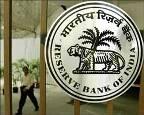 Global agency Moody's described the RBI's decision on Tuesday to keep key policy ratios and rates unchanged as the end of central bank's soft monetary stance and said it could tighten the policy in a year from now to tame the emerging inflationary pressure.
Global agency Moody's described the RBI's decision on Tuesday to keep key policy ratios and rates unchanged as the end of central bank's soft monetary stance and said it could tighten the policy in a year from now to tame the emerging inflationary pressure.
"The Reserve Bank of India's decision to sit tight at the July meeting marks the end of the monetary loosening regime. . .The RBI (is) likely to commence monetary tightening a year from now, as inflation may again emerge as a concern to policymakers," Moody's Economy.com said.
The RBI in its first quarterly review of the credit policy kept the repo and reverse repo -- short-term rates at which banks lend and borrow from RBI--unchanged, retained economic growth projection at 6 per cent with an upward bias and projected inflation at around 5 per cent by March, 2010.
Expressing the same view, rating agency Crisil principal economist D K Joshi said, "it shows that interest rates are not going to be lowered. They (banks) will wait and watch."
Yes Bank chief economist Shubhada Rao said, "the RBI is getting ready to withdraw monetary easing measures. However, it will not rush."
HDFC Bank chief economist Abheek Barua said, "given the inflationary pressures, the RBI might like to unwind the liquidity enhancing measures it has taken till now."
Financial services firm Goldman Sachs said the policy statement signalled a move away from the sole focus on boosting demand to giving more weight to inflation.
"Inflationary pressures have been acknowledged explicitly and the WPI target revised upwards. We think the RBI has adequately judged the balance of risks, and provided a comprehensive delineation of challenges going forward," it said.
Moody's added that monetary policy moves take time to filter through to the economy.
"Although the global climate is still s little unstable, cutting rates cannot help to immediately boost domestic activity. Instead, policymakers are counting on previous rate cuts to influence market rates now," it said.
Barua said there could be a possibility of lowering of interest rates in the next two months.
"By October, it will start stabilising. That means an upward trend could be seen in the fourth quarter of this fiscal," he said.
According to Crisil's Joshi, the central bank raising the growth and inflation risk targets show that inflation is still a risk concern for the RBI.
Yes Bank's Rao said that the tone of the policy is to emphasise and support growth as well as keep a vigil on inflation.





